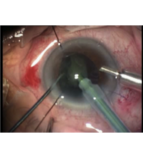
Phacoemulsification with lens implant
Phacoemulsification is the commonest technique use for cataract operation in UK.
The technique has evolved over the last two decades with better machine and better technique that the operation is a lot safer and much shorter recovery time.
The operation is commonly performed under local anaesthetic and as a day case.
On the day of the operation
If your operation is going to be undertaken under local anaesthetic, then you can eat normally but it would be a good idea to eat lightly as you will be lying down for surgery.
You should wear loose cloths, most hospitals will allow you to wear your own cloths into the operatinf theatre, so make sure that your cloths are clean. It would be a good idea to bring a pair of slippers to the hospital.
Phacoemulsification is the commonest technique used for cataract surgery in UK. This technique includes making a small incision at the corner of the eye. A jelly-like substance is then injected inside the anterior chamber to prevent the chamber from collapsing.
The anterior capsule that wrap around the crystalline lens is peeled off with a can-opening maneuver. An ultrasound probe is inserted inside the eye that produce high frequency ultrasound to break the lens substance into fragments. The lens fragments are then broken into pieces by using the ultrasound probe and suck away.
The remnants lens fibres are then cleaned from the capsular bag in preparation for a lens implant. The anterior chamber is then filled with a jelly like substance to facilitate the lens implantation.
The artificial lens implant (IOL) is then loaded in a injection cartridge and ready to be injected inside the eye. The IOL is unfold inside the eye and resting inside the capsular bag, which is important to keep the IOL in a central position. The jelly-like substances is then aspirated away and the wound is sealed by injecting water at the wound to create a self-sealing closure. Antibiotic and steroid are then injected inside the eye.
An cottonwool eye pad and a plastic shield are used to cover the eye. The patient can go home with a mixture of antibiotic and steroid eye drops. Patients can remove the eye pad in the next day and start using the post-operative eye drops.
How successful is Phacoemulsification cataract surgery?
Phacoemulsification cataract surgery is a very successful operation. The risk of complication is very low in very experienced surgeons' hand. Like any operaion, however, there is a small risk of complication.
Generally speaking, the risk of complication is 1 in 100 chance for minor complications that requires prolonged medication treatment or further surgery is necessary. There is a 1 in 1000 chance for serious complications that can risk losing the sight of an eye.
Minor complications include rupture of the capsule during surgery that require alternative lens implant, post-operative excessive inflammation, raised eye pressure and swelling of the retina (Cystoid macular oedema). More serious complication including bleeding inside the eye during the operation, dropping part of the lens fragment into the posterior segment, and post-operative infection (endophthalmitis).




